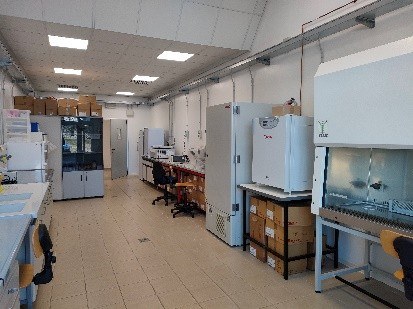Cellular and molecular animal biology lab
|

|
Histology, TEM, SEM
Animal and human cell culture
Exosome extraction and analysis
Immunofluorescence and in situ hybridisation (confocal and epifluorescence)
Gene expression (RT-PCR, qPCR)
Biochemical analysis (ELISA test)
Bioinformatic and statistical analysis (RNAseq, miRNAseq)
Contacts: Colitti Monica
|
Animal production lab
|
Analysis of microbiome (DNA bar code)
Biochemical and hormonal analysis of biological fluids (blood, plasma, serum, milk, urine, saliva) and hair
Chemical analysis of foods and feeds
Functional genomics
Contacts: Bruno Stefanon, Sandy Sgorlon
|
Cell signaling & biochemistry Lab
|

|
Cell culture (animal and human; immortalized and primary).
Structural, functional and expression-based proteomics
In vitro, in vivo and ex vivo biochemical assays for the evaluation of bioactive compounds of natural or synthetic origin (drug discovery, drug development and drug delivery)
Immunofluorescence/immunohistochemistry microscopy
Contacts: Andrea Venerando
|
Immunology Lab
|
Study of inflammatory and immune responses in farmed fish species
Prevention of infectious diseases in aquaculture via immunostimulation and vaccination treatments
Histology / immunohistochemistry
Evaluation of cellular immunity parameters (proliferation and oxidative burst)
Evaluation of specific and nonspecific immunity parameters in serum.
Contacts: Volpatti Donatella
|
Food microbiology Lab
|
Study of microbial ecology in food production using classical and molecular microbiological methods (NGS, WGS)
Selection and study of microbial strains (bacteria and yeasts) as starters and/or bioprotective agents for food and beverage fermentation optimization—aimed at reducing energy inputs and promoting “green label” sustainable production in line with One Health objectives
Selection of probiotic microbial strains and study of strain/microbiota/human interactions
Wine Fermentations: micro and macro-vinifications: studies on processes optimization, selection of non-Saccharomyces - Saccharomyces yeast and LAB strains for sustainable productions and to solve emerging production problems due to climate change.
Production of microbial bioactive compounds by microbial fermentation of food chain by-products.
Contacts: Lucilla Iacumin
|
Agro-environmental microbiology Lab
|
Recovery of ligno-cellulosic residues for biopolymers production.
Biodegradation studies of contaminant materials and molecules, depuration and wastewater recycling.
Soil sector: optimization of microbial biofertilizer formulations, studies on rhizosphere microbiota influence within organic vs. traditional cultivations as well as to evaluate the effects of nanoparticles used for vegetative support to plants.
“Sustainability of primary production” and “Global changes and ecosystem conservation”, Thematic Area “Plant Science”. The new vision of agricultural productivity passes through the reduction of traditional fertilizations and enhancement the soil microbiota potential. In addition to identifying the unique processes triggered by PGPR microorganisms, it will be important to have a clear view of the systematic framework of how and to what extent plants can shape their own harmful or beneficial microbiome to promote the development of companion plants.
Contacts: Marcello Civilini
|
Industrial microbiology Lab
|
Production of polyhydroxyalkanoates (PHA): from microbial biopolymers to bioplastics.
Management of biological processes of wastewater treatment plants in the wine sector
Contacts: Marcello Civilini
|
Microbiology and digital health Lab
|
Study of the phylogenetic and functional diversity of Legionella species.
Services for health and the environment. Create a research center for Legionella environmental and health monitoring at regional and national level. It is planned to create a level 2 biosafety structure in which to receive, store and treat strains from regional reference centers and health environments. In parallel, create a data processing center that can guide disinfection and treatment actions in public and private structures in the territory.
Artificial Intelligence and machine learning applied to predictive microbiology. Legionella, predictive diffusion models, spread of antibiotic resistance, and genetic changes over time. Study of microbial ecology in the environment, soil, plants, and animals (NGS, WGS, etc.)
Contacts: Lucilla Iacumin, Marcello Civilini
|

